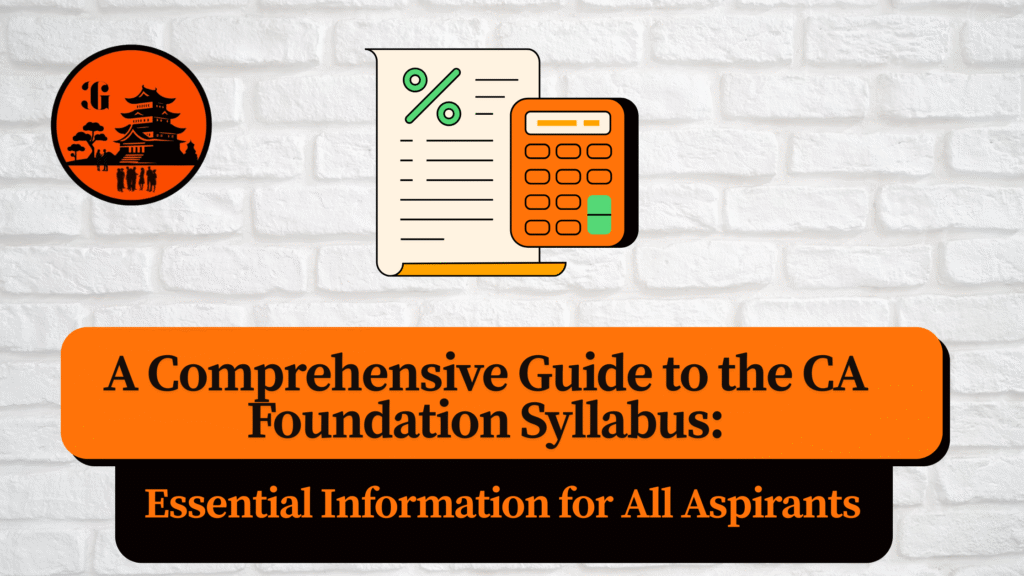
Understanding the CA Foundation syllabus is a crucial first step if you intend to pursue a career in chartered accounting. The CA Foundation course lays the groundwork for a future in accounting, auditing, and finance both literally and figuratively. It is the Institute of Chartered Accountants of India’s (ICAI) entry-level exam. This blog post gives you a clear and confident start to your preparation by delving deeply into the topics, structure, and study techniques associated with the CA Foundation syllabus.
The CA Foundation Course: What Is It?
The first of three stages in the chartered accountancy path is the CA Foundation. It is intended to assess a student’s foundational knowledge of accounting, business, law, and mathematics, and it took the place of the CPT (Common Proficiency Test). Students who have finished or are taking their Class 12 board exams are eligible to take the exam, which is held twice a year, usually in May/June and November/December.
Students must create a strategic study plan that fits the framework of the CA Foundation syllabus, which has been updated by ICAI on a regular basis to reflect the changing demands of the industry, if they are to succeed.
The CA Foundation Syllabus Structure
The four papers that make up the CA Foundation syllabus are two subjective and two objective. Here is a thorough explanation:
Paper 1: Accounting Principles and Practice
The foundations of financial accounting are covered in this paper.
Accounting principles, final account preparation, partnership accounts, and company accounts are among the subjects covered.
A strong understanding of this paper is crucial because accounting is the backbone of the entire CA curriculum.
Paper 2: Business Laws and Business Reporting and Correspondence
Section A: Laws Concerning Businesses emphasizes fundamental legal concepts.
The Indian Partnership Act, the Sale of Goods Act, and the Indian Contract Act are among the subjects covered.
Section B: Reporting and Business Correspondence
covers communication skills like business vocabulary, letter and report writing, and comprehension.
This section aids students in honing their professional communication abilities.
Paper 3: Statistics, Logical Reasoning, and Business Mathematics a subject with high scores if properly prepared.
Calculus fundamentals, equations, and ratios and proportions are all included in business mathematics.
Number series, coding-decoding, puzzles, and other activities are all part of logical reasoning.
Averages, dispersion, correlation, and regression are the main topics of statistics.
Paper 4: Business Economics and Business and Commercial Knowledge
Section A: Business Economics,
Supply and demand, production theory, market structures, and pricing tactics are among the subjects covered.
Section B: Knowledge of Business and Commerce
introduces students to global trends, entrepreneurship, business cycles, and the Indian economy.
Method of Analysis
Subjective in nature, Papers 1 and 2 assess the depth of comprehension.
Multiple-choice questions (MCQs) make up Papers 3 and 4, which are objective and have a 0.25 mark penalty for incorrect answers.
Each paper is worth 100 points, and they take three hours to complete.
To pass, you must receive at least 40% on each paper and 50% overall.
How to Get Ready for the CA Foundation Course Material
Recognize the Exam Pattern:
Start by thoroughly comprehending each subject and how the test weights it.
Utilize the ICAI Study Guide:
The books and practice exams offered by ICAI are the most accurate representations of the real paper format and are strongly advised.
Establish a Study Schedule:
Set aside time each day to work on all four papers. To keep preparation lively, strike a balance between subjective and objective subjects.
Practice and Edit:
Regular problem-solving is essential for courses like statistics and mathematics. Concentrate on comprehending ideas and making frequent revisions for law and economics.
Take Mock Exams:
Time management and confidence are enhanced by practicing in exam-like settings.
Typical Obstacles and How to Get Past Them
Syllabus Volume:
At first, the syllabus might seem overwhelming, but it can be made manageable by breaking it down into daily objectives.
Time management:
juggling CA and school/college Preparing a foundation can be challenging. Spend the weekends studying hard.
Fear of Failure:
The CA journey causes anxiety in many students. Keep in mind that consistency is more significant than genius.
Concluding remarks
The purpose of the CA Foundation curriculum is to evaluate both practical application and conceptual clarity. It’s crucial to fully understand these topics because they serve as the foundation for the more complex CA course levels. Clearing the CA Foundation is completely possible with the correct preparation and guidance, regardless of whether you are a commerce student or have a non-commerce background.
Gaining a firm grasp of the CA Foundation syllabus at the beginning of your career will not only help you pass the test but also give you the self-assurance you need to face the challenges that lie ahead. Remember that every great chartered accountant started where you are now, so go deep, study wisely, and never give up.